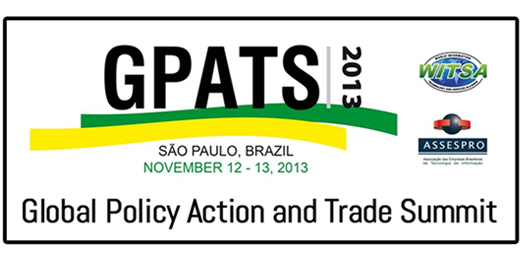On November 12-13, 2013 Brazil hosted the first World Summit on Public Policy (IT GPATS 2013), conducted by the Association of Brazilian Companies for Information Technology (National Assespro) in partnership with WITSA (Federation World Entities IT) as the event took place at the Convention Center Rebolledo, in Sao Paulo.
The Global Policy and Trade Summit (GPATS) is a signature event of WITSA aimed at enhancing international dialogue and global cooperation on key public policy issues that affect the growth of the ICT industry and use of ICT. Between 300-500 senior industry executives, government officials and policy makers from across the globe were at this event that is held every two years to share information and discuss how governments, industry and other stakeholders can work together to facilitate the growth of ICT for the benefit of everyone. Particular focus was put both on effective government policies from around the globe, as well as the free trade agreements regarding ICT goods and services. In attendance in Brazil were internationally recognized organizations such as the World Bank, WTO, ICANN, ITU, IGF and the OECD, as well as governments, industry, academia and civil society.
NIA¡¯s Executive Director of the Global IT Cooperation Division, Dr. Jeongwon Yoon was invited to the event in Brazil in order to share Korea¡¯s experience in ICT Policy as a member of a high-level panel that included participants from Macedonia, Chile, Brazil, Argentina and of course, Korea. The session brought together diverse examples of national policy agendas, frameworks and priority actions that are promoting the development and use of ICTs to achieve economic and social development. These include education and skills development, building the information infrastructure and developing ICT national industries. The session was mediated by the Minister of Information Society of the Republic of Macedonia, Mr. Ivo Ivanovski.







